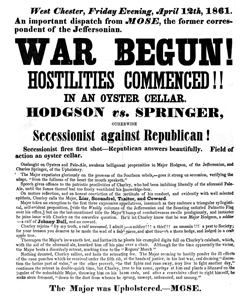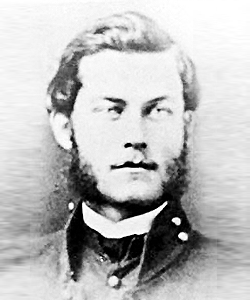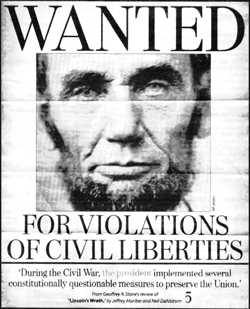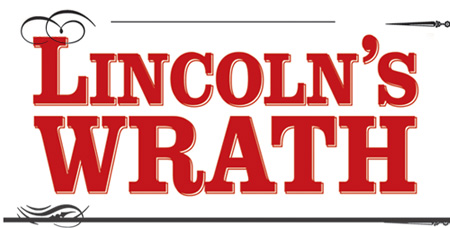"Lincoln's Wrath makes usually subtle, and sometimes not so subtle connections to current politicsLincoln's Wrath is a good step in the direction of de mythologizing American history and thus of setting us on a sound basis for the future."

Below details a chronological Accounting of the Civil War and the
Battle for Freedom of the Union Press. Inter Arma Silent Leges. (In a time of war the laws are silent)


"A dictator fills the place which Washington once occupied, and a vulgar tyranny has been substituted for the constitutional government which was once the boast of the American people."





1860-1861
From the opening moments of the Civil War the Lincoln Administration moved to stifle dissent against the conduct of the War. There was not one moment, one turning point in Abraham Lincoln’s determination to circumvent the rights of the Constitution.
In contrast to Lincoln’s views, one American institution stood opposed: the courts. Whether it is John Hodgson’s lawsuit against the Administration or the 1864 Supreme Court determination that the “Constitution is not made for peace alone. It is not merely for fair weather.”
This is the first full chronological accounting of the Administration actions against freedom of speech and the legal counter attacks of the anti-war Democrats.
1860
November 3 John Hodgson publishes one of his first anti-Lincoln, anti-war editorials, stating openly that "As sure as there is a God in heaven, we will have fearful times in our country should the North elect Lincoln."
November 6 Abraham Lincoln elected as president of the United States on the Republican ticket
November 14 Congressman Alexander Stephens of Georgia announces that the "principals of the President-elect were an antagonism to our interests" and would "subvert the Constitution under which we now live...Concluded Stephens, "Let the fanatics of the North break the Constitution." Stephens was opposed to secession.
December 20 South Carolina becomes the first state to succeed from the Union.
1861
January 9 Mississippi leaves the Union.
January 11 Alabama leaves the Union.
January 19 George leaves the Union.
January 26 Louisiana leaves the Union.
February 1 Texas leaves the Union.
February 8 Confederate constitution adopted.
February 23 Lincoln arrives in Washington at 6am.
March 4 Inauguration of Lincoln.
April 12 Fort Sumter is attacked and surrenders the next day. John Hodgson has a fistfight in an oyster bar over the conduct of the Lincoln Administration. Everyone in the small town of West Chester realizes that Hodgson has perhaps gone too far.
April 17 Virginia votes to leave the Union.
April 19 Baltimore riots where pro-secessionists clash with Union soldiers. Four soldiers and nine civilians killed in the street riots.
April 27 Lincoln suspends privilege of write of habeas corpus from Philadelphia to Washington, under the discretion of General Winfield Scott.
May 6 Arkansas leaves the Union.
May 20 North Carolina votes to leave the Union.
May 27 Supreme Court Justice Taney rules that the military arrest of John Merryman in Maryland violated the privilege of the writ of habeas corpus and the president did not have the authority to suspend.
Abraham Lincoln ignored the ruling.
July 2 General Winfield Scott authorized by Lincoln to suspend the privilege of the writ of habeaus corpus near military lines between New York and Washington.
July 4 Lincoln addresses a special session of Congress defending his use of special war powers (including suspension of writ of habeas corpus).
July 21 First Battle of Bull Run (Manassas).
July 22 House of Representatives passes the Crittenden Resolution stating that the war is being waged "to defend and maintain the supremacy of the Constitution and to preserve the Union", and not to interfere with slavery.
July 25 United States Senate passes the Crittenden Resolution.
July 31 US Congress approves act that defines conspiracy against the US and set up punishments for the crime
to destroy by force the government of the United States.
August 3 Writes Frank Key Howard of Baltimore, "A dictator fills the place which Washington once occupied, and a vulgar tyranny has been substituted for the constitutional government which was once the boast of the American people." Howard provides a snapshot of the efforts by the Baltimore political community to starve off their being put wholesale into jail. Efforts are made to involve the President and he refuses, saying that is would be "incompatible with public interest."
August 12 Riot in Concorde which shuts down anti-war newspaper.
August 14 Major General John Charles Fremont declares martial law in St. Louis, followed by suppression of two
pro-Southern newspapers.
August 15 Charges of disloyalty for alleged 'pro-Southernism" is brought against the New York Journal of Commerce, Daily News, Day Book, Freeman's Journal and Brooklyn Eagle in US Circuit Court.
August 16 Grand Jury meeting in New York asks the judge whether the government can punish anti-war newspapers.
August 17 The Democratic newspapers, desperate to show they reflect an important part of public opinion, publish numbers showing that there are over one hundred and fifty newspapers against the conduct of the War. "Our readers are a larger army than Lincoln will ever get together," hopefully writes one. No actions stem the onslaught from Washington.
August 19 Hodgson's Jeffersonian in West Chester Pennsylvania is raided by a mob. So too a newspaper in Easton, Pennsylvania. A publisher in Haverhill, Massachusetts is tarred and feathered by an angry mob. The publisher is forced to write that "I am sorry that I have published and will never again write or publish articles against the North."
August 21 Postmaster General Blair orders copies of New York newspapers that allegedly are aiding rebellion not to be carried by the mail. They are confiscated in Philadelphia. Pro-administration newspapers consequently enjoy huge jump in revenues from news hungry public.
August 21 St. Louis Morning Herald is closed down by the Provost Marshall.
August 22 Suppression of anti-administration newspapers continues in New York, Canton, Ohio and Philadelphia. Federal officials move against the New York Daily News and the Day Book.
August 22 The Freeman's Journal is shut by the administration. Editor James McMaster arrested under orders of Secretary of State Seward, charged with treason. Imprisoned in Fort Lafayette for eleven weeks and released with no trial. He later ran for Congress.
August 22 Hodgson's Jeffersonian shut again. This time not by an unknown mob but by federal authorities acting"by authority of the President."
August 23 The True American of New Jersey shut down.
August 24 Forney, a pro-Lincoln publisher, writes in the Philadelphia Press that the Administration has decided that "those newspapers that do not yield a hearty support to the Government..shall be warned to desist, and if they persist, shall be suppressed. Attorney General Bates has been consulted on the subject and says that the Government would be perfectly justified in doing so."
August 26 War Department issues order No 67 based on Act of Congress from 1806 that one cannot communicate with the enemy. Fears on part of Democrats that this is another nail in the coffin of freedom of the press.
August 30 Charles Fremont issues an unauthorized emancipation proclamation. Declaring martial law in Missouri, he seeks to confiscate all property of "those who shall take up arms against the United States."
September 7 The Marshall seized and stopped circulation of the New York News.
September 10 Three Baltimore papers shut: Daily Exchange, The Daily Republican and The South. Before shut, Exchange compares the many anti-war editors confessing to their sins to "how it smacks of the blessed times when old women were forced
to sign a confession that they were witches and then were drowned or hanged for their pains. How naturally "pernicious" editors assume the place of "devil-ridden" hags."
September 11 James W. Wall of New Jersey arrested and held without trial at Fort Lafayette for supporting freedom of the newspapers. He was a popular editorial writer who later runs and wins a seat in the US Congress.
September 12 Frank Key Howard, grandson of Francis Scott Key, who wrote our national anthem, is sent to Fort McHenry, as is Thomas Hall, editor of the South. Howard ends up imprisoned for over 14 months without trial; his diary is an incredible accounting of the measures taken by the Administration to keep the men imprisoned. Near the end, Howard, his brother and his father, all imprisoned, refuse to sign a loyalty oath. Frank Howard is finally released.
September 12 Grand Jury in New Jersey names five newspapers as anti-war and asks the public not to support them.
September 15 During a cabinet meeting, Lincoln defends the government's actions in arresting alleged disloyal Maryland citizens without charges.
September 16 Behind the scenes pressure on the Brooklyn Eagle, nations largest evening newspaper, to force the publisher to step down or face loss of advertising. Unusually honest notes from young editor allows window into pressures being put on all newspapers opposed to the War and the ability to change the tone of many of the anti-war editors into something more positive for the Administration.
September 20 Maryland's political and media community rounded up and sent to Fort Lafayette jail outside of New York harbor. Renamed by the political prisoners "The American Bastille," the list of those arrested and confined without trial include the leading political figures, real estate developers, businessmen, editors and writers.
September 23 Charles Fremont arrests a newspaper editor for criticizing the conduct of the Union troops during a siege of Lexington, Kentucky.
October 7 Case of John Hodgson and closing of the Jeffersonian goes to trial. Hodgson is represented by
two noted Democrats, George Biddle and William B. Reed.
October 14 Lincoln authorizes General Scott to suspend habeas corpus anywhere between Bangor Maine and Washington because of suspected subversion.
December 2 Lincoln instructs General Halleck to suspend the privilege of the writ of habeas corpus whenever necessary. "The Union must be preserved and hence all indispensable means must be employed.
December 26 Martial law is proclaimed in St. Louis and in and about all the railroads of Missouri.

